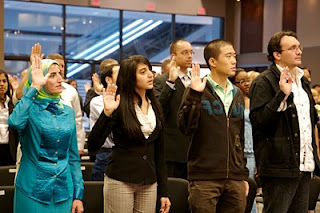FCC Chairman, Julius Genachowski, has been in the news a lot recently speaking about the future of broadband internet access in America and what we can do to develop it. One phrase being stressed is digital citizenship – are you an effective citizen of this new, digital nation?
To find the answer, we first must ask, “Why the concept of a digital nation, and how are we citizens of it?”
- A nation is commonly defined as “a grouping of people who share real or imagined common history, culture, language or ethnic origin, often possessing or seeking its own government.” (Wikipedia)
Loosely interpreted, this does apply to the many people who find community online. Denizens of the interwebs are increasingly using tools such as Twitter, Facebook, and MySpace to find and bond with people of like history, culture, or interest. The fact that all of these groups in turn share a common experience and environment with its own, very specific social norms contributes to the idea of a digital nation.
- Google defines citizenship as “the fact of belonging to a community…and the duties and responsibilities that this brings.” (Google)
The aforementioned social norms are quite specific to interacting online. With detailed profiles and elaborate branding, online presences increasingly reflect and serve to represent the personalities of their respective people in the real world. With the myriad ways for these online presences to interact (e.g. chat, posting, blogging, commenting), certain systems of etiquette and social structure are necessary and naturally developed.
- Genachowski offers the definition of digital citizenship as “the values, ethics, and social norms that allow virtual communities, including social networks, to function smoothly.” (CNET)
Genachowski, speaking for the FCC and the Federal Government, is specifically outlining a new commitment to instilling values and ethics in the younger generations – those that will have the most involvement in the online domain. In order for our real-world societies to run smoothly in the future, he asserts, it is necessary to teach our young ones how to conduct themselves properly and efficiently in our digital communities as well. Simply put, the quality of our digital citizenship will greatly impact the success of our physical nation.
- Digital Etiquette: electronic standards of conduct or procedure.
- Digital Communication: electronic exchange of information.
- Digital Literacy: process of teaching and learning about technology and the use of technology.
- Digital Access: full electronic participation in society.
- Digital Commerce: electronic buying and selling of goods.
- Digital Law: electronic responsibility for actions and deeds.
- Digital Rights & Responsibilities: those freedoms extended to everyone in a digital world.
- Digital Health & Wellness: physical and psychological well-being in a digital technology. world.
- Digital Security (self-protection): electronic precautions to guarantee safety.
The idea that a virtual community could have so much influence on the real world is a relatively new concept. More specifically, the idea that our behavior and conduct as members of a digital nation must be structured and schooled from the federal level is positively mind-blowing. While I agree with the FCC on its future importance, I certainly never saw a government-led effort coming. What do you think about this concept, and where do you think we’ll end up taking it?
Comment and share to keep the discussion going. And subscribe via RSS or Email if you like this blog!
Photo credits: Tact and Etiquette by Valentinian

 FCC Chairman, Julius Genachowski, has been in the news a lot recently speaking about the future of broadband internet access in America and what we can do to develop it. One phrase being stressed is digital citizenship – are you an effective citizen of this new, digital nation?
FCC Chairman, Julius Genachowski, has been in the news a lot recently speaking about the future of broadband internet access in America and what we can do to develop it. One phrase being stressed is digital citizenship – are you an effective citizen of this new, digital nation?

Recent Comments